Throughout the course of history, there has never been an easier or better time to start your own business than there is today. If you are planning to start an online store, then now is a great opportunity.
When it comes to website builders, so many discussions have been held regarding Shopify vs Custom-built websites: Which one should we invest in? Both have their advantages and disadvantages, along with various elements to consider before making the final investment.
With that being said, we are going to identify the differences between Shopify vs custom-built websites. Before answering the key question: which one should we invest in when running an eCommerce site, we will discuss on below aspect:
- An Overview of Shopify vs custom-built websites
- Which should you choose between Shopify vs custom-built websites?
Let’s get started!
Want to Migrate Your eCommerce Platform?
If you are intending to migrate from one eCommerce platform to another, LitExtension offers a great migration service that helps you transfer all your data accurately and seamlessly with utmost security.
Shopify vs Custom-built Websites: An Overview
To begin with, we are going to give clear definitions of website builders which are Shopify vs Custom-built Websites:
- Shopify is an eCommerce platform that allows anyone to set up an online store and sell their products. Over 10 years, Shopify is now the leading eCommerce platform designed for businesses of all sizes. Founded in 2004, Shopify now has more than 4,000,000 stores in almost 175 countries. Accordingly, it is the no.1 software in the shopping cart category.
- Custom-built websites will involve a team behind your business. It starts with a creative process to get to know about the target audience, marketing strategy, website’s functionality and design. Furthermore, you need to find your own hosting provider, or some third-party extensions to fully operate your website. Accordingly, custom-built websites tend to take longer than other eCommerce platforms.
Now, we are going to let you know the differences between Shopify vs Custom-built Websites, their pros and cons and far more details so that you can choose the best solution for your own business.
You might be also interested in reading:
- Magento vs Shopify Comparison – Which One is The Ultimate Choice?
- OpenCart vs Shopify: Which One Is Best for Your Business?
- WooCommerce vs Shopify – A Head-To-Head Comparison
- Shopify vs Squarespace: What’s The Better Pick?
Pricing
Shopify
Seeing as Shopify vs Custom-built Websites are the two differences in terms of pricing because of its natures. Shopify has 3 main plans for the store owners to choose from depending on the business sizes. They are Basic Shopify ($39), Shopify ($105), and Advanced Shopify ($399).
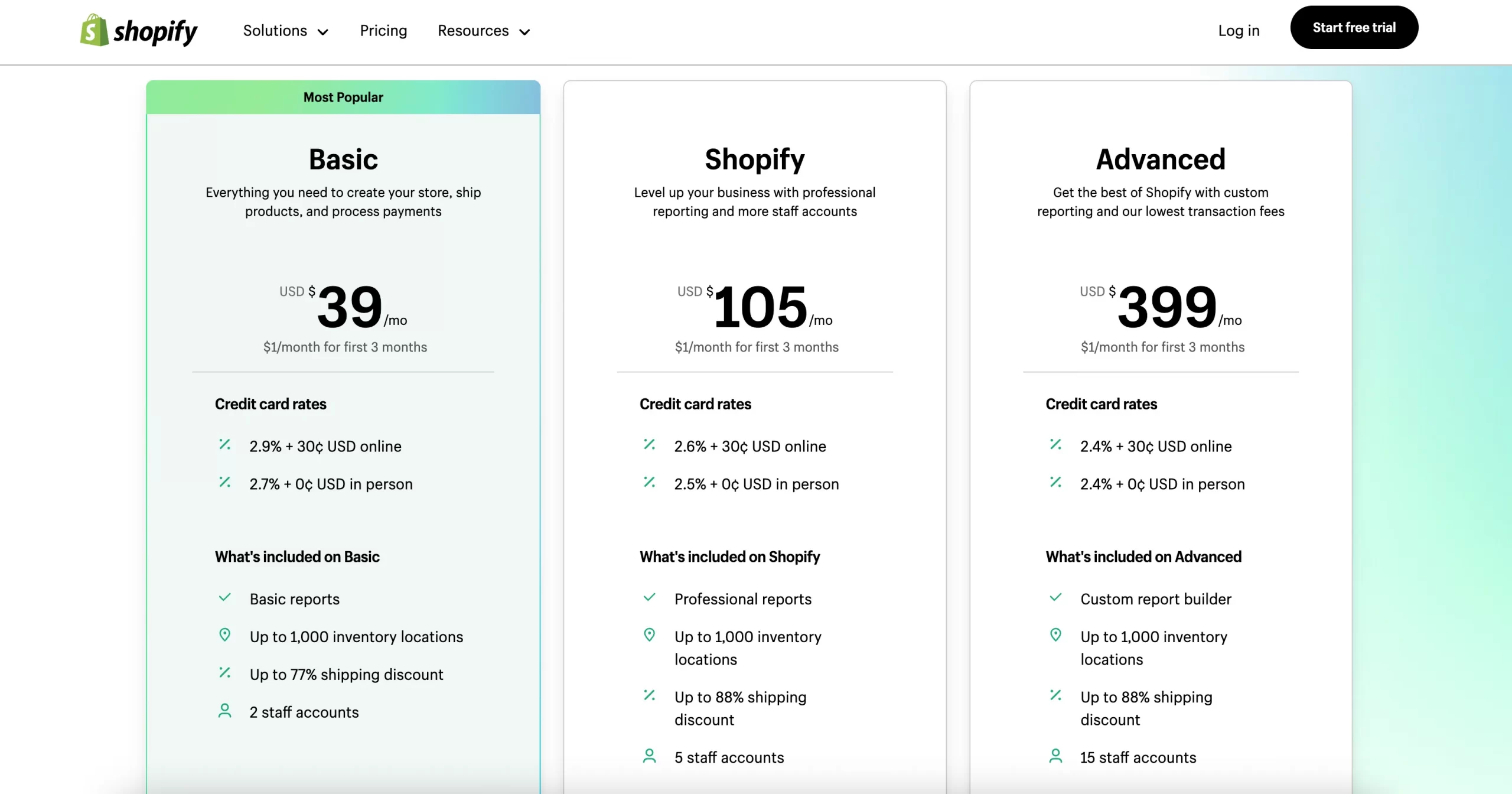
New to Shopify? You can make use of a 3-day free trial to try out Shopify yourself. Even if you give your credit card info during the first 2 weeks, Shopify still lets you cancel at any time without charging anything.
In fact, with Shopify, the merchants do not need to buy a Secure Socket Layer (SSL) certificate when going for a business plan. If you just simply need a basic store to sell online, then the Basic Shopify plan can totally satisfy your needs. You will receive discount codes, unrestricted storage, multi-channel integrations, 24/7 support and so on.
Additionally, when choosing the higher plans, which are Shopify and Advanced Shopify, you will receive better analysis and reporting. Obviously, the more you pay for the package, the more benefits and great features you will receive.
Custom-built Website
With a custom-made website, you will need to pay for almost every feature individually. This includes a domain, web hosting, an SSL certificate, custom site design, eCommerce plugins, email marketing, payment gateways and far more.
In the long term, with your own custom-made website, there will be other unexpected costs that arise during operation and maintenance.
To conclude, a simple measurement should reveal that Shopify is clearly a better solution when it comes to finance.
Ease of use
Shopify
It is undeniable that starting your business with Shopify is far more straightforward than building a store by yourself. It’s designed for everyone, from eCommerce experts to total beginners. You don’t need to have knowledge in creating websites to get yourself a fully functional online store just in a matter of minutes.
After filling in your email address, a password for your account and a store name to get started, Shopify will take you to an initial configuration.
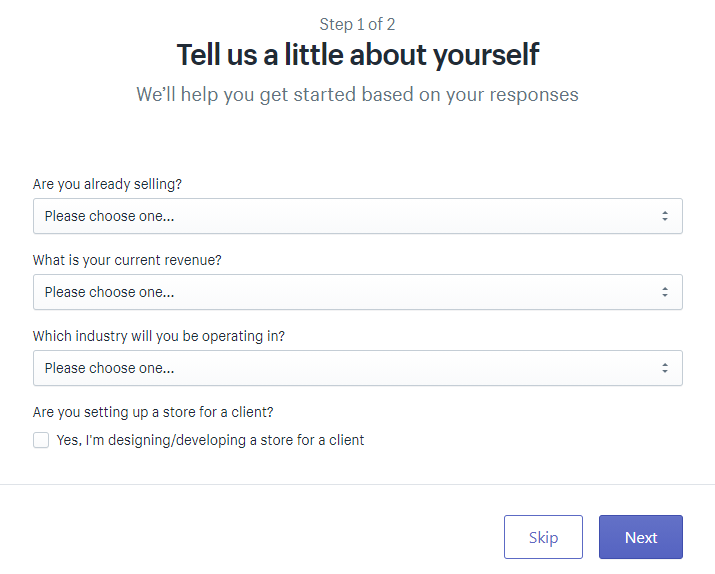
Normally, the very first step you should take before creating your own website is to find out what you need for your store. However, right after creating an account, Shopify will ask you some questions about your trading’s purposes and then give you some suggestions to make your store fully functional. The main page shows the shortcuts to adding a domain, customizing your theme and adding products.
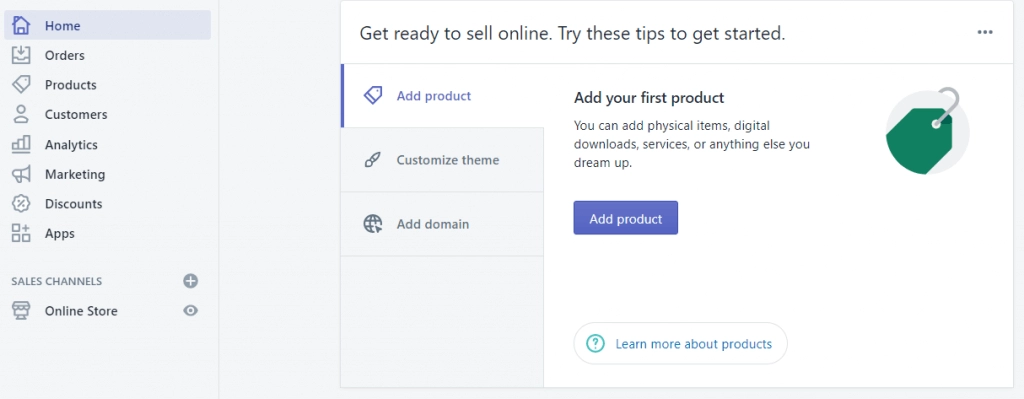
In the picture above, you can easily see that the dashboard is pretty clear and simple with categories consisting of corresponding sub-sections for easy navigation.
If you are not sure about the process, then this video below will show you how easy it is to create a Shopify store and give directions to configure your eCommerce store:
Custom-made website
If you create your own online store with a self-hosted solution, you will need a web developer and to seek out hosting and domain services like Bluehost or GoDaddy. The most important thing is, having a custom website means that you must have experience with coding and technical knowledge to build your store. Otherwise, passing the job to a skillful developer or a team is an optimal solution that can help you with the website setup.
Furthermore, to manage your own store, you should consider setting up a CMS for managing your blog and website. Plus, it is highly recommended that you may need to install a plugin with eCommerce functionalities to customize your e-store.
Let’s take WordPress as an example. The merchants usually use this platform to create their site and integrate with WooCommerce (a WordPress plugin) to get the full package of eCommerce features.
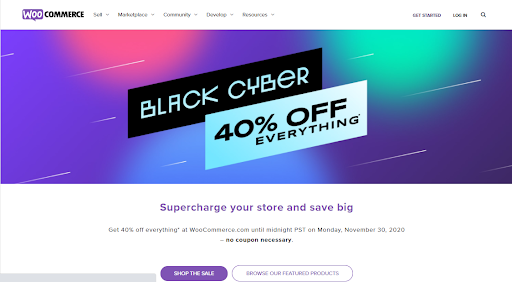
The verdict box
For those who are not familiar with coding and technical knowledge, Shopify is definitely a perfect choice. If you want to challenge yourself with coding, then building a website from scratch may bring your vision to life.
Want to Migrate Your Store and Grow on Shopify?
Having decided that the custom-built website is no longer the perfect fit? Switch to Shopify now and rocket your online business with powerful eCommerce functionalities, extensive apps, and improved loading speed with this platform.
Design & Customization
It’s clear that a dazzling storefront will capture attention and implicitly boost sales. Fortunately, both Shopify vs Custom-made website can satisfy store owners – just in different ways.
Shopify
Shopify has a ton of beautifully-designed, responsive templates and themes to satisfy any store owners’ requirements. Up to now, this platform offers over 100+ best Shopify themes, including 11 free themes and 90+ paid ones. The price for the themes and templates is between $0 – $350.

However, each theme also has specific adjustments. In case you want to add some elements, or maybe you have an idea for a new feature that you think would improve the customer experience, Shopify Liquid is an effective way to modify your website’s underlying code. Hence, you can have various designs which can be edited flexibly to suit your demands.
Custom-made Website
On the other hand, for the custom-made website, you’ll spend more time and effort than usual to find the optimal theme. When researching, make sure that it’s got a thousand positive reviews and active users. Along with flexibility in store design, the template needs to adapt to your audience’s values.
In case you don’t have a web designer, there is still a huge theme marketplace where you can find plenty of responsive designs with affordable prices compared to the Shopify Theme Store. The awesome thing about having a personalized store design is that you will have unlimited space for customization. It is completely flexible, and you can have your own one-of-a-kind website.
The verdict box
While Shopify can help you save resources by providing easy-to-use, free yet professional themes, custom-made websites enable diversity and personalization in theme choices, although with more effort.
eCommerce features
Shopify
Since Shopify is an exclusive eCommerce platform, it provides sellers a plethora of eCommerce features. Here are some of the excellent ones:
- Fraud analysis: This can identify false orders and decrease chargebacks because Shopify can gather evidence for any disputed charges.
- Payment gateway providers: The merchants can choose Shopify Payment options such as Visa, Master Cards, etc. which are PCI compliant. Otherwise, using other payment providers is still allowed, but you need to pay transaction fees.
- Product management: Shopify lets you add products by clicking on “Products” right in the dashboard, where you can also manage your products. Plus, you can fill in related information about the products you sell. It can be a title, a description, featured images, videos and far more.
- Shipping: Shopify allows you to configure your shipping rates such as free shipping, flat rate,…) With the Advanced Shopify plan, you can also unlock third-party calculated shipping rates. Therefore, customers can see the current courier prices at the checkout.
Custom-built Websites
Besides finding a proper platform and software to run your online business, you should choose reliable payment gateways and other high-quality extensions that fit the best of your eCommerce needs. But having those eCommerce features means that the process requires coding to fully function your online store. Or else, hiring a developer and paying quite a lot of money is the final solution.
The verdict box
With Shopify, you’ll have plenty of efficient eCommerce features given to you already. But for custom-made websites to work, you’ll need to have coding skills or resources to hire a developer.
Third-party integration
Shopify
The store owners now can buy extensions and plugins through Shopify App Store. This platform is currently having more than 8000 apps which include third-party applications. Shopify supports a huge number of third-party apps which assist with marketing, SEO, inventory tools and heaps more.
The merchant can now build a fully functional website with those apps. These apps help to extend the capabilities such as shipping, accounting and so on. As a result, Shopify is an all-in-one package that can offer merchants a great number of eCommerce solutions.
Whenever you can think of a feature, there’s probably a plugin for that to help you build a website of your dream. For instance, if you want to extend your reach, the platform supports sales channels integrations like Amazon or Facebook.
Custom-built Websites
With your own custom website, the situation is contrasting. The procedure requires a lot of analysis, research time and some pretty substantial fees to filter out the most suitable plugin for your website.
One thing you should be aware of is that those plugins/extensions are made by hundreds of developers around the world. Therefore, there’s no certainty that your plugins/extensions will work exactly as expected. You need to be careful about what to add to your website to avoid glitchy and slow performance.
The verdict box
Shopify clearly wins this part as it offers you credible integrations, saving you a whole lot of time and money. While with custom-built websites, there might be risks and unknown costs.
Security
Shopify
Apparently, there’s less to worry about when you choose a hosted platform – Shopify. You barely need to do anything – Shopify will take care of all tasks regarding security in the background. This platform offers free SSL registration for all online merchants as well as automatic updates. With SSL certificates, Shopify can help you to:
- Use HTTPs to add a new authentication layer to your store instead of HTTP.
- Place the SSL icon next to the URL of your online store to help gain customer interest.
Thankfully, all Shopify stores are certified Level 1 PCI DSS compliant (a.k.a Payment Card Industry Data Security Standard). This is a data security standard for every company that accepts card payment to comply. All your data and your customer information are ultra-secure with Shopify.
Custom-built Websites
In contrast, when it comes to security, you will need to pay a certain amount of money to set up your security background. Plus, the process can be frustrating when unidentifiable problems arise.
The verdict box
Shopify has the advantage here as it offers free SSL certification and helps you with all data security set-ups. However, using custom-built websites would require in-depth security knowledge, time and financial resources.
Support
Shopify
There is no exaggeration to say that Shopify’s support service is one of the strongest points compared to other platforms. In all Shopify plans, they offer 24/7 support via email and live chat that is always available to help. Furthermore, from Basic Shopify, they also provide 24/7 phone support but only in the English language.
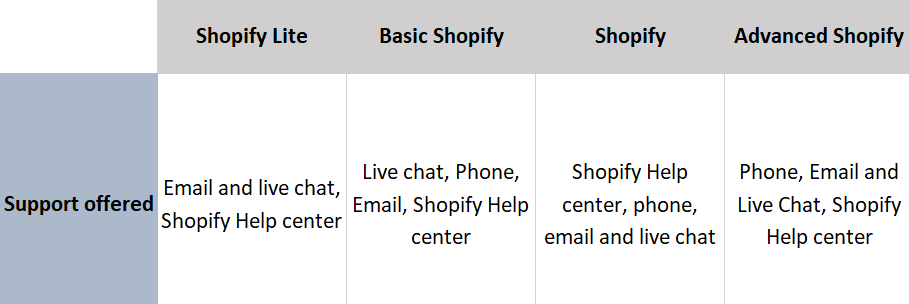
Especially for text support such as email or live chat, Shopify support team can connect via 19 languages for store owners all over the world. You can check out this list to see whether your first language is come-at-able or not.
Shopify not only has its 24/7 support team but also a community forum and other video tutorials. In particular, Shopify has a large community for experts and Shopify users to share their experience and knowledge with others widely.
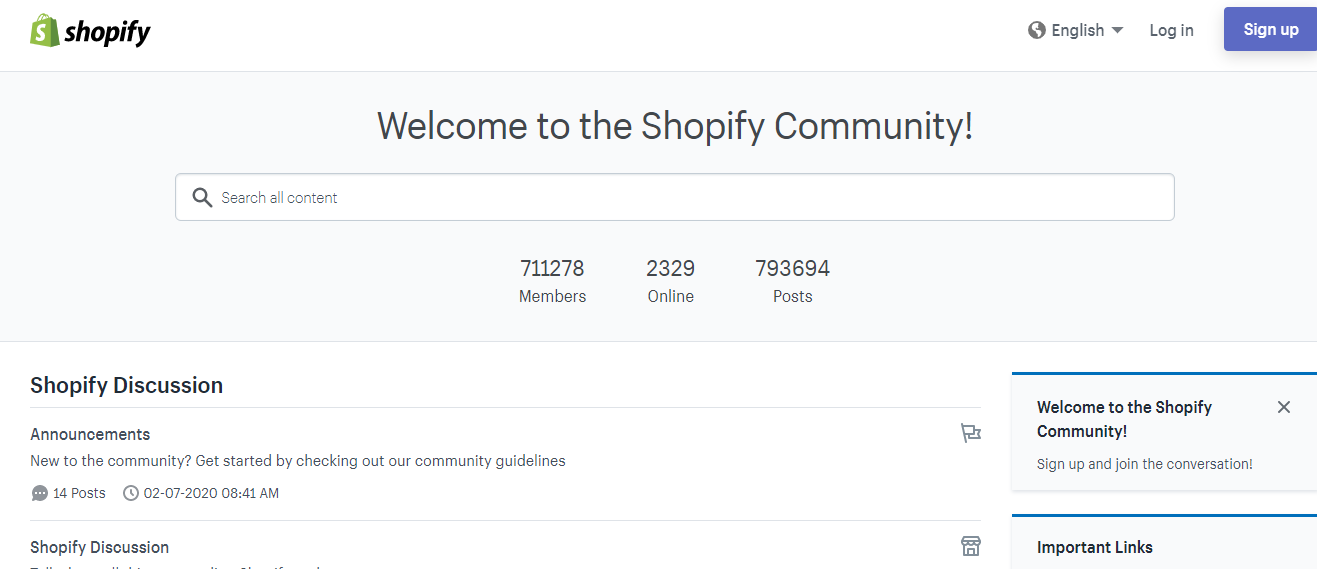
At the same time, this community is the place where third parties can get insights into current merchants’ needs or trendy products. Accordingly, the Shopify community can open up a world of opportunities to connect with merchants and partners in a meaningful way.
Custom-built Websites
On the other hand, for the custom-made website, the learning resources can be collected from Google, Youtube, forums, videos, blogs, etc. There is no limitation to the range of resources, but you should spend more time researching what you want for your customers.
Let’s take WooCommerce as a typical example. If you use WooCommerce as a solution for your business, it supports tutorial documents only. Moreover, they don’t have any private support such as email, or phone calls.
In general, in the battle of Shopify vs Custom-built websites, Shopify is obviously outstanding in terms of support service compared to custom-built websites. This platform has all kinds of services that will definitely take care of you at any time.
Bonus reading:
Shopify vs Custom-built Websites: Key Questions to Help You Decide
If you are new to website building and do not know how to start your business, then Shopify is your best option. This ready-to-use platform can cover all your business demands with a simple interface and reasonable pricing as well. Let’s try out Shopify’s free trial in 2 weeks to test its interface and build a demo store yourself.
However, if you are looking for uniqueness and freedom in customization, then having a custom-built website is a good choice. But remember that, building your website on your own can take a long time to complete and you surely pay a pretty penny for other elements to function your online store.
Make Your Migration Project A Breeze with LitExtension
Don’t have time to manually perform the migration? Let LitExtension lift the burden off your shoulder with our top-of-the-class migration service. Enjoy a streamlined and secure data transfer process without having to lift a finger!
Final Words
Hopefully, this head-to-head comparison between Shopify vs Custom-built Websites can answer your burning question, “Which one should I invest in?”. There is no right or wrong – it all depends on your demands and requirements for your business. That’s not to mention there’s AI website builder that just been slowly coming up in recent years.
In case you want to migrate your current website to Shopify, LitExtension – #1 Shopping Cart Migration Expert is eager to help you! As the world-leading shopping cart migration, we can assure you to transfer all your current data speedily, securely and accurately with our automated migration tool.
For further information related to data migration, please don’t hesitate to contact our LitExtension customer support, we are here to help you!
